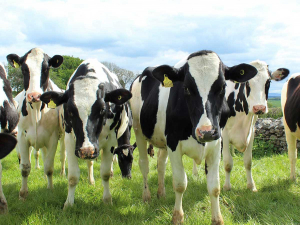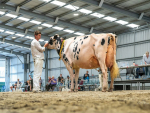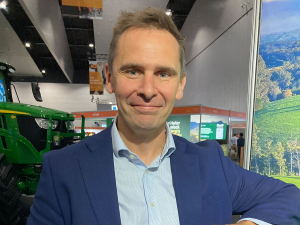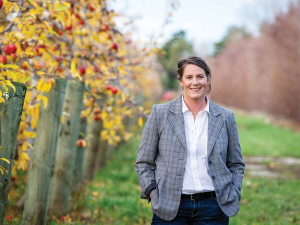For Matamata dairy farmers Michelle and Bill Burgess, one cattle breed is ticking all the boxed for their milkers this mating season.
Milking 330 Holstein Friesian and Friesian cross cows on 100ha, the couple is moving from a crossbred herd to a predominantly Holstein Friesian herd.
With the high-input herd averaging 600 kgMS+, Michelle and Bill are heavily focused on both fully feeding their herd and using the best genetics available to breed a high-producing, fertile, healthy cow with low incidence of lameness and mastitis.
As a member of the NZAEL Farmer Advisory Panel, Michelle says she's really come to appreciate the diversity of the Holstein Friesian breed throughout heryears farming and studying genetics and breeding.
"In one single herd book you can find genetics ranging from high BW to World Dairy Expo show winners, and everything in between," she says.
"We are spoilt for choice with possibly the biggest range to choose from.
"The choice in udder quality is incredible. You can find bulls who will add strength and capacity similar to dual purpose breeds, or correct coarse cows with more femininity and milkiness. You can increase your stature or liveweight, or decrease it to an average crossbred size. You can breed calves who will be born a week early. There are bulls with incredibly health traits to offer, or novel traits such as A2 or polled.
"If you want, you can even choose a 90% black cow, or a very white one, or perhaps a red or a lineback.
"The Holstein Friesian breed offers incredible diversiyt and the size of the population means that there are plenty of options to avoid the imbreeding nightmares that plague many breeds."
Wendy Harker of Westell Holstein Friesians says the ability to source Holstein Friesian genetics from not only New Zealand but overseas means farmers don't need to rely on hybrid vigour.
"You can breed the type of animal you want without resorting to crossbreeding," she says.
"There is enough variety of genetics available in the global Holstein Friesian pool to achieve the animal you want within the breed. There is a worldwide population of Holstein Friesians - as well as comprehensive global genetic research - to call on."
Holstein Friesian cows are well-known for their high production, giving farmers the option to reduce stocking numbers and therefore, improve their environmental impact.
"When production per cow is higher, you not only see higher levels of fat and protein, but you don't have to sacrifice overall production to see the environmental benefits that come from fewer cows on the land," Wendy says.
"You also require fewer facilities, staff and infrastructure, and there are less cows to manage throughout the season."
Fewer Cows, More Milk
Michelle Burgess says as farming evolves, and profitability and potential regulations drive farmers to re-evaluate the cows they milk, there's more of a push for cow efficiency than ever before - in all farming systems.
"Bill and I used to lease a farm milking up to 750 cows on 200ha, all through a very old 20-a-side herringbone shed," she says.
"Those years pushed us to try and produce the most milk we could profitably, with the least amount of cows. We achieved 398,000 kgMS with 650 cows on that farm, as the low-payout years forced us to buy less feed and therefore reduce our stocking rate.
"As a result, we were able to get debt-free and buy our first farm just nine years into our farming career."
Michelle says in her experience, the Holstein Friesian cow has the engine to consume more feed per cow, and put it straight in the vat without getting too fat.
"Here farmers can enjoy all the benefits of having lower stocking rates," she says.

















